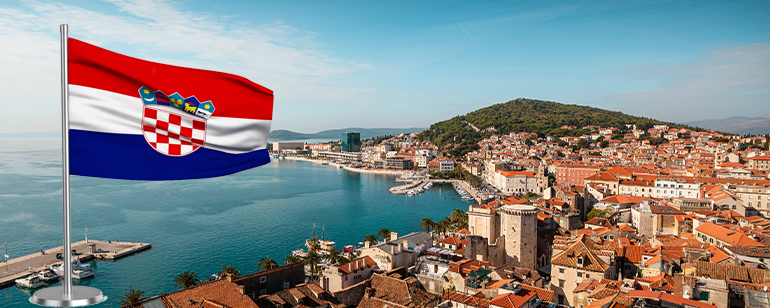
Contact Info

Destination

Croatia at a Glance
| Fact | Detail |
| Capital | Zagreb |
| Religion | Predominantly Catholic (86.3%) |
| Calling Code | +385 |
| Area | 56,594 sq km (21,851 sq mi) |
| Total Population | 3.88 million (2023 estimate) |
| GDP (PPP) | $104.2 billion (2022 estimate) |
| Location | Central & Southeastern Europe, bordering the Adriatic Sea |
| Currency | Euro (EUR) |
| Border Countries | Slovenia, Hungary, Serbia, Bosnia and Herzegovina, Montenegro |
| Passport Ranking | 8th (2023 Henley Passport Index) |
A Sunny Outlook with a Hidden Challenge
Croatia, a picturesque nation renowned for its stunning coastline and rich history, boasts a thriving tourist industry and a growing technology sector. However, beneath this sunny facade lies a pressing challenge: a manpower shortage. An aging population and immigration trends are leaving crucial positions unfilled across vital industries.


India and Nepal offer a potential solution. These countries possess a wealth of young, skilled professionals eager to contribute to a dynamic economy:
1. Large Workforce Populations: India, with the world's second-largest population, and Nepal, with a rapidly growing pool of skilled workers, offer a vast talent pool.
2. Focus on Education: Both nations invest heavily in education, producing graduates with relevant technical and vocational skills.
3. Global Exposure: Indian and Nepalese professionals possess a strong work ethic and adaptability, gained through experience in international markets.
By attracting Indian and Nepalese talent, Croatia can:
1. Fill Skill Gaps: Address critical shortages in sectors like tourism, construction, and IT.
2. Fuel Innovation: A more diverse workforce fosters fresh perspectives, leading to new ideas and business opportunities.
3. Ensure Long-Term Growth: Immigration helps stabilize Croatia's population structure, ensuring a sustainable workforce for the future.
1. Skills & Expertise: These workers bring valuable skills in areas facing shortages, like hospitality, construction, IT, and engineering.
2. Work Ethic & Adaptability: Renowned for their dedication and willingness to learn, they seamlessly adapt to new environments and challenges.
3. Cost-Effectiveness: Hiring from these countries can be cost-effective, offering competitive salaries while filling critical positions.
4. Multilingual Capabilities: Many possess English language skills and potentially some knowledge of Slavic languages, valuable assets for communication and the tourism industry.
1. Tourism & Hospitality: Croatia's booming tourism sector requires skilled chefs, waiters, bartenders, and hotel staff.
2. Construction: Infrastructure development projects and a vibrant construction sector seek skilled workers like masons, carpenters, and electricians.
3. Information Technology (IT): Croatia's IT industry is experiencing rapid growth, requiring skilled software developers, network engineers, and data analysts.